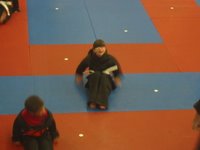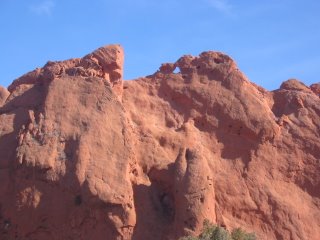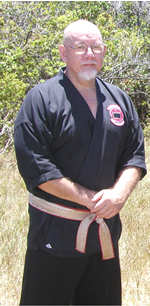 The history of the Universal Kempo Karate Schools Association (UKKSA) emerges from powerful roots into a colorful past. The practical and effective knowledge prevalent in the UKKSA curriculum was developed from countless battlegrounds in the streets and rings throughout the world and evolved from the wisdom of many professors and instructors. The UKKSA's methods reflect the strong influence and innovations of its current leadership. The UKKSA embraces the best of the traditions of the old ways and welcomes the visions of the new. The UKKSA's curriculum maintains the challenging and rigorous training of the ancient ways and successfully employs the proven methods of today. Chinese Kempo Karate is an eclectic system, which merges the realistic aspects of karate, judo, jujitsu, grappling, weapons, and boxing arts. The dynamic curriculum is measured by high standards and represents a realistic challenge for all participants. The exceptional versatility of the UKKSA's self-defense system is tailored to meet the needs of all individual's sizes, strengths, and abilities. Chinese Kempo Karate readily adapts to the demands of a changing world and equips the student with the mental and physical skills to meet any threat. The creative methods and innovations of this versatile system keep the UKKSA on the cutting edge of the martial arts world. The UKKSA owes its quality standards and preeminence in the martial arts world to its founder, Professor Martin T. Buell. Professor Buell resides on the island of Oahu, Hawaii, and is one of the most recognized and respected Kempo instructors in the world. In 1981, the UKKSA was founded by Professor Buell, which marked the beginning of the prolific growth of the progressive association.
The history of the Universal Kempo Karate Schools Association (UKKSA) emerges from powerful roots into a colorful past. The practical and effective knowledge prevalent in the UKKSA curriculum was developed from countless battlegrounds in the streets and rings throughout the world and evolved from the wisdom of many professors and instructors. The UKKSA's methods reflect the strong influence and innovations of its current leadership. The UKKSA embraces the best of the traditions of the old ways and welcomes the visions of the new. The UKKSA's curriculum maintains the challenging and rigorous training of the ancient ways and successfully employs the proven methods of today. Chinese Kempo Karate is an eclectic system, which merges the realistic aspects of karate, judo, jujitsu, grappling, weapons, and boxing arts. The dynamic curriculum is measured by high standards and represents a realistic challenge for all participants. The exceptional versatility of the UKKSA's self-defense system is tailored to meet the needs of all individual's sizes, strengths, and abilities. Chinese Kempo Karate readily adapts to the demands of a changing world and equips the student with the mental and physical skills to meet any threat. The creative methods and innovations of this versatile system keep the UKKSA on the cutting edge of the martial arts world. The UKKSA owes its quality standards and preeminence in the martial arts world to its founder, Professor Martin T. Buell. Professor Buell resides on the island of Oahu, Hawaii, and is one of the most recognized and respected Kempo instructors in the world. In 1981, the UKKSA was founded by Professor Buell, which marked the beginning of the prolific growth of the progressive association.

This site is a combination of family events and other things that catch my interest. Please feel free to leave a friendly comment, by clicking on the 'comments' link found at the bottom of each article. Thank you and enjoy!
26 November 2006
Kate, the Karate Kid
Kate has just started Kempo-Karate.
Here's a little bit about the art and a few photo's of her first lesson.
.
.
History of the Universal Kempo Karate Schools Association“Standards of Excellence”
25 November 2006
Thanksgiving at the Novak's
23 November 2006
Happy Thanksgiving
The First Thanksgiving

The first American Thanksgiving was celebrated in 1621, to commemorate the harvest reaped by the Plymouth Colony after a harsh winter. In that year Governor William Bradford proclaimed a day of thanksgiving. The colonists celebrated it as a traditional English harvest feast, to which they invited the local Wampanoag Indians. Days of thanksgiving were celebrated throughout the colonies after fall harvests. All thirteen colonies did not, however, celebrate Thanksgiving at the same time until October 1777. George Washington was the first president to declare the holiday, in 1789.
A New National Holiday
By the mid–1800s, many states observed a Thanksgiving holiday. Meanwhile, the poet and editor Sarah J. Hale had begun lobbying for a national Thanksgiving holiday. During the Civil War, President Abraham Lincoln, looking for ways to unite the nation, discussed the subject with Hale. In 1863 he gave his Thanksgiving Proclamation, declaring the last Thursday in November a day of thanksgiving. In 1939, 1940, and 1941 Franklin D. Roosevelt, seeking to lengthen the Christmas shopping season, proclaimed Thanksgiving the third Thursday in November. Controversy followed, and Congress passed a joint resolution in 1941 decreeing that Thanksgiving should fall on the fourth Thursday of November, where it remains.
Garden of the Gods

Imagine standing here 150 years ago. You observe a red rock wilderness, no settlement nearby and footpaths traveled by American Indian people for centuries. What would you name this place?
Back in 1859, not long after the "Pikes Peak or bust" gold rush began, a group of men explored the nearby area to determine a place for a townsite at the base of Pikes Peak. They names their new town Colorado City, as "Colorado" is Spanish for "red," like the surrounding land. As they looked over this area of cathedral-like rock spires, one man, Malancthon Beach, commented that the spot would be a great place for a beer garden someday. His friend, a poetic young man names Rutous Cable, replied that it was a place "fit for the Gods."
The name Garden of the Gods has expressed the awe and admiration felt by Cable and by visitors ever since.
Kissing Camels
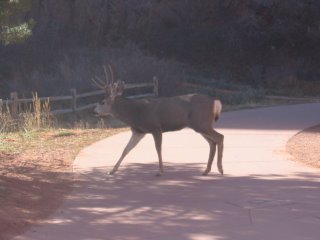 Local deer taking a stroll
Local deer taking a stroll
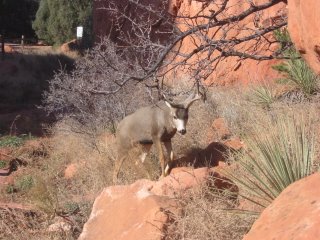
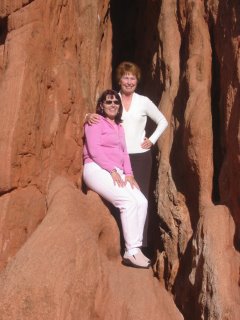
Denise & Mum
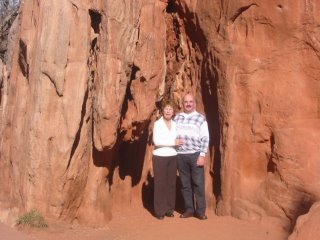
Mum & Mick
Pikes Peak in the distance
15 November 2006
No Monkeying Around
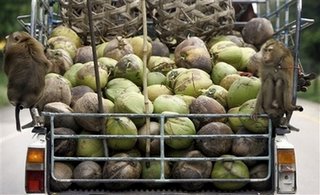 Monkeys ride on the back of a pickup truck fully loaded with coconuts after collecting them from a plantation in Chumphon province, southern Thailand Tuesday, Oct. 31, 2006.
Monkeys ride on the back of a pickup truck fully loaded with coconuts after collecting them from a plantation in Chumphon province, southern Thailand Tuesday, Oct. 31, 2006. The monkeys, the pig-tailed macaques, can quickly scamper up the trunk of a coconut palm, select the ripe ones and with a twist and pull the fruit will drop to the ground. 'One monkey can pick about 300 coconuts a day. The monkey works 10 times quicker than a man,' said Somboon Cheumuang, the monkeys' owner.
About 1,200 trained monkeys are working as coconut pickers in the country's southern coastal provinces of Prachuab Khiri Khan, Chumphon, Surat Thani, Ranong and Nakhon Si Thammarat.
I Spy a Huge Colonel Sanders
Subscribe to:
Comments (Atom)


